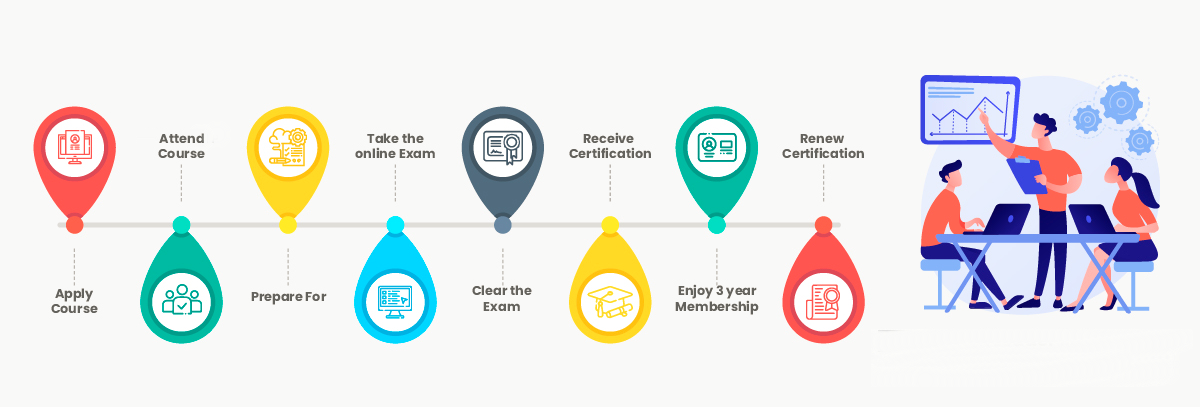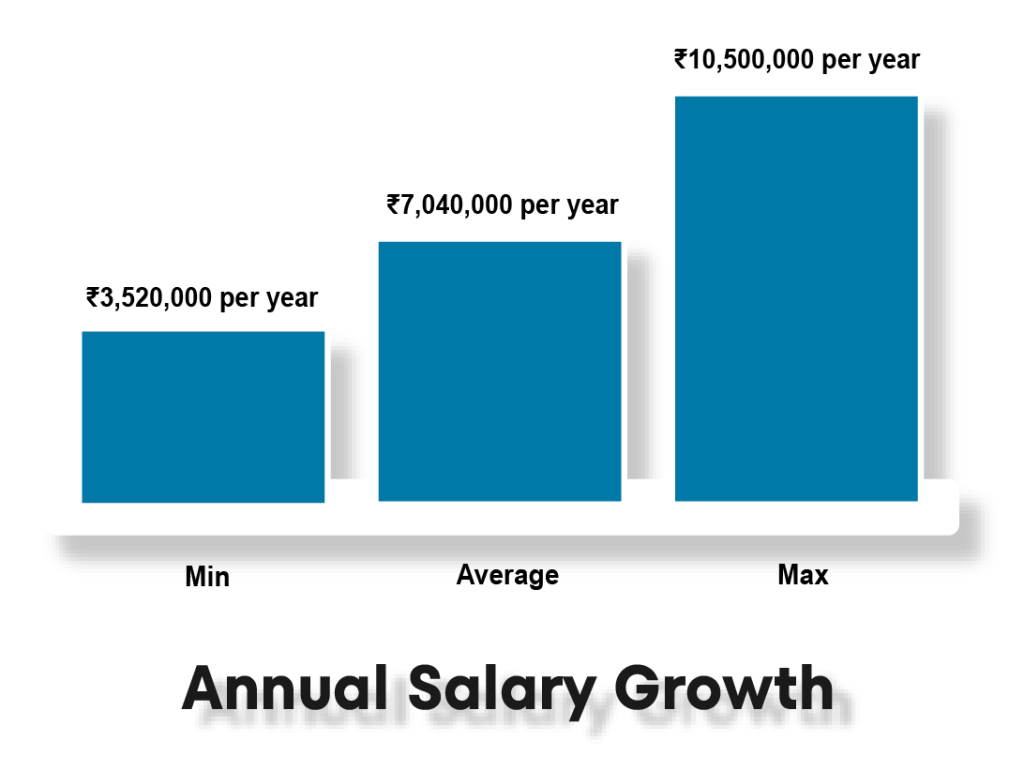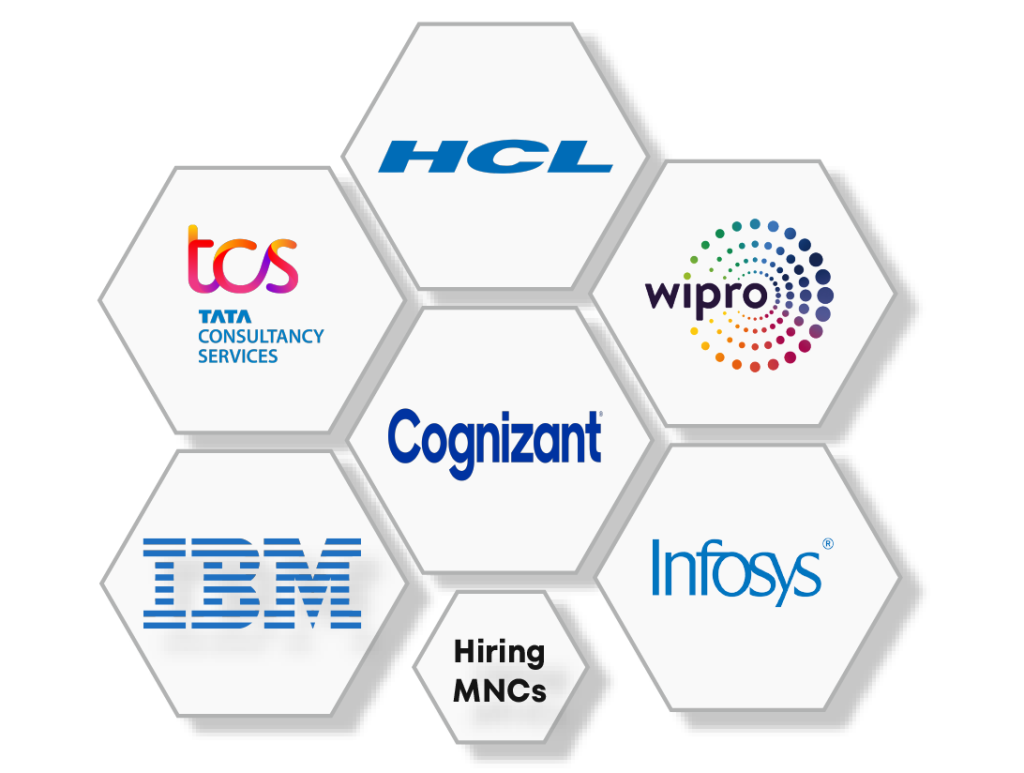
The Education Nest AWS SysOps Certification Training has been developed by industry experts with the objective of helping you pass the AWS Certified SysOps Administrator Associate Exam (SOA-C02). The program is designed to teach you how to handle, maintain, and operate workloads on AWS while implementing security measures and ensuring compliance requirements are met. The curriculum has been structured in a way that enables you to master various AWS services like ELB, Route53, EC2, S3, Glacier, Cloudwatch, Cloudtrail, IAM, and VPC, as well as their configurations. Completing this AWS SysOps training is a prerequisite for obtaining the DevOps Engineer Certification. By enrolling in this program, you can get certified and become a critical part of the global cloud revolution.
Application Deadline: Jun 30, 2023
Upskill for Your Dream Job
Sambodhi and Education Nest offer a comprehensive AWS SysOps training course designed to equip learners with the necessary skills to become AWS certified SysOps administrators. The course includes live project-based training with hands-on experience in various tools and services of AWS. Participants will learn to deploy, manage, and operate scalable and highly available systems on AWS while ensuring that they are secure and compliant. The course covers topics such as AWS CLI, EC2 instances, Elastic Load Balancing, Auto Scaling, Route 53, RDS, S3, CloudFormation, CloudTrail, CloudWatch, and more. Upon completion of the course, learners will be prepared to take the AWS Certified SysOps Administrator – Associate exam.



Instructor-led AWS SysOps live online Training Schedule
May 15th – Weekend
July 1st – Weekend
Why enroll for AWS SysOps Certificate Training Course?

"Growing demand for cloud computing skills in general, with job postings for cloud-related roles increasing by over 60% between 2015 and 2020. " - Burning Glass

Gartner's Cloud Infrastructure and Platform Services Magic Quadrant listed AWS Cloud Platform as leaders. AWS SysOps is used in various industries such as healthcare, retail, education, finance, and many more.

According to PayScale, the average salary for an AWS SysOps Administrator in the United States is around $86,000 per year, while Glassdoor reports the average salary to be $106,000 per year.

AWS SysOps Training Course Benefits
If you enroll in Education Nest’s AWS SysOps certification course, you can get ready for a good-paying job as an AWS SysOps Administrator. AWS has been dominating the overall cloud infrastructure market for years now, with more than 30 percent share. AWS SysOps training can open up new career opportunities, such as becoming a Cloud Operations Engineer or Cloud Infrastructure Engineer, with a higher earning potential. AWS constantly updates its services and features, and AWS SysOps training ensures that you stay up-to-date with the latest technologies and trends. According to Fortune Business Insights, the global cloud computing market size could rise from USD 480.04 billion in 2022 to USD 1712.44 billion by 2029.

Annual Salary

Hiring Companies
Want to become a Cloud Computing
Professional?
Why AWS SysOps Certificate Training Course from Education Nest






AWS SysOps Skills Covered
AWS SysOps Training Course Syllabus
AWS SysOps Training Projects

In the retail industry, AWS SysOps can be used to improve the customer experience, manage inventory, and optimize supply chain operations. One project could involve using AWS tools like EC2, RDS, and S3 to build a scalable and secure e-commerce platform. Another project could be implementing a real-time analytics system using AWS Lambda and Kinesis to gain insights into customer behavior and preferences. Additionally, AWS SysOps can be used for inventory management by leveraging Amazon SNS to send notifications when inventory levels are low, and Amazon CloudWatch to monitor performance and ensure reliability of the system. Overall, AWS SysOps can help retailers improve operational efficiency, reduce costs, and enhance the customer experience.

AWS SysOps plays a crucial role in managing and operating cloud infrastructure in the IT industry. Some of the popular projects involving AWS SysOps include implementing and managing multi-tier applications on AWS, automating infrastructure deployment, managing and optimizing AWS costs, ensuring high availability and scalability of applications, implementing security and compliance measures, managing and monitoring various AWS services, and implementing disaster recovery solutions. These projects require expertise in various AWS services such as EC2, S3, VPC, CloudFormation, CloudTrail, CloudWatch, and more. Knowledge of AWS SysOps is essential for any IT professional who wants to excel in cloud computing and DevOps.
AWS SysOps Training Description
The AWS SysOps course is designed to provide individuals with the necessary knowledge and skills to operate and manage a highly available, scalable, and fault-tolerant system on AWS. The course covers a range of topics including deployment, management, security, troubleshooting, and monitoring of AWS services. Participants will learn how to optimize AWS infrastructure to meet business requirements, and gain a deep understanding of AWS architecture best practices. The course also includes live project-based training to ensure participants get hands-on experience working with AWS SysOps tools and technologies. Upon completion of the course, participants will be equipped with the skills needed to design, deploy, and operate scalable and fault-tolerant systems on AWS.
The objectives of the AWS SysOps course are:
Here are some reasons to learn AWS SysOps course:
High Demand: AWS SysOps skills are in high demand, and businesses of all sizes are adopting AWS cloud services for their IT infrastructure, making it a valuable skillset to have.
Career Advancement: Learning AWS SysOps can help you advance your career in the IT industry, as it is an essential skill for IT professionals who want to work with AWS.
Improved Efficiency: AWS SysOps enables businesses to optimize their IT operations, reduce costs, and improve overall efficiency. Learning this course can help you to be more efficient in your job role.
Hands-on Experience: The course provides live project-based training, allowing you to gain hands-on experience in managing and operating AWS infrastructure.
Better Understanding: Learning AWS SysOps helps you gain a better understanding of AWS services, best practices, and operational procedures.
Preparation for Certification: The course prepares you for the AWS Certified SysOps Administrator – Associate exam, which is a widely recognized certification in the industry.
The AWS SysOps course is suitable for:
Anyone who is interested in pursuing a career in the IT industry and wants to learn about the latest technologies and trends in SysOps and AWS.
The pre-requisites for the AWS SysOps course are as follows:
Here are some other popular software for cloud computing:
Microsoft Azure: A cloud computing platform that provides a range of services for building, deploying, and managing applications and services through Microsoft-managed data centers.
Google Cloud Platform (GCP): A cloud computing platform that offers infrastructure, platform, and software as a service (IaaS, PaaS, and SaaS) solutions for computing, storage, and data analytics.
IBM Cloud: A cloud computing platform that provides infrastructure, platform, and software as a service (IaaS, PaaS, and SaaS) solutions for computing, storage, and data management.
VMware Cloud: A cloud computing platform that offers a range of solutions for hybrid and multi-cloud environments, including virtualization, infrastructure, and management tools.
Oracle Cloud Infrastructure (OCI): A cloud computing platform that provides a range of services for building, deploying, and managing applications and services through Oracle-managed data centers.
Amazon Elastic Compute Cloud (EC2): A web service that provides resizable compute capacity in the cloud, making it easier for developers to scale their applications.
The AWS SysOps course is designed to provide individuals with the necessary knowledge and skills to operate and manage a highly available, scalable, and fault-tolerant system on AWS. The course covers a range of topics including deployment, management, security, troubleshooting, and monitoring of AWS services. Participants will learn how to optimize AWS infrastructure to meet business requirements, and gain a deep understanding of AWS architecture best practices. The course also includes live project-based training to ensure participants get hands-on experience working with AWS SysOps tools and technologies. Upon completion of the course, participants will be equipped with the skills needed to design, deploy, and operate scalable and fault-tolerant systems on AWS.
The objectives of the AWS SysOps course are:
Here are some reasons to learn AWS SysOps course:
High Demand: AWS SysOps skills are in high demand, and businesses of all sizes are adopting AWS cloud services for their IT infrastructure, making it a valuable skillset to have.
Career Advancement: Learning AWS SysOps can help you advance your career in the IT industry, as it is an essential skill for IT professionals who want to work with AWS.
Improved Efficiency: AWS SysOps enables businesses to optimize their IT operations, reduce costs, and improve overall efficiency. Learning this course can help you to be more efficient in your job role.
Hands-on Experience: The course provides live project-based training, allowing you to gain hands-on experience in managing and operating AWS infrastructure.
Better Understanding: Learning AWS SysOps helps you gain a better understanding of AWS services, best practices, and operational procedures.
Preparation for Certification: The course prepares you for the AWS Certified SysOps Administrator – Associate exam, which is a widely recognized certification in the industry.
The AWS SysOps course is suitable for:
Anyone who is interested in pursuing a career in the IT industry and wants to learn about the latest technologies and trends in SysOps and AWS.
The pre-requisites for the AWS SysOps course are as follows:
Here are some other popular software for cloud computing:
Microsoft Azure: A cloud computing platform that provides a range of services for building, deploying, and managing applications and services through Microsoft-managed data centers.
Google Cloud Platform (GCP): A cloud computing platform that offers infrastructure, platform, and software as a service (IaaS, PaaS, and SaaS) solutions for computing, storage, and data analytics.
IBM Cloud: A cloud computing platform that provides infrastructure, platform, and software as a service (IaaS, PaaS, and SaaS) solutions for computing, storage, and data management.
VMware Cloud: A cloud computing platform that offers a range of solutions for hybrid and multi-cloud environments, including virtualization, infrastructure, and management tools.
Oracle Cloud Infrastructure (OCI): A cloud computing platform that provides a range of services for building, deploying, and managing applications and services through Oracle-managed data centers.
Amazon Elastic Compute Cloud (EC2): A web service that provides resizable compute capacity in the cloud, making it easier for developers to scale their applications.
AWS SysOps Certificate Training Course reviews
Read learner testimonials
Rodriguez
I gained the confidence and skills to program independently. The knowledge sharing session was excellent with insightful explanations. I thoroughly enjoyed my time here.
Harper Lee
In my opinion, the course is excellent as it is. I thoroughly enjoyed the learning process, and it has broadened my knowledge significantly. Overall, it was a delightful and engaging experience.
Sneha Singh
Sambodhi is an excellent institution that provides quality training and management. Their courses are designed to maintain a high standard, and their teachers offer continuous support. I highly recommend this institution to anyone seeking hands-on training on the latest technologies. The staff is incredibly supportive and cooperative, making the learning experience even better.
Hear from our learners
Lorem ipsum dolor sit amet, consectetur adipiscing elit. Ut elit tellus, luctus nec ullamcorper mattis, pulvinar dapibus leo.
Lorem ipsum dolor sit amet, consectetur adipiscing elit. Ut elit tellus, luctus nec ullamcorper mattis, pulvinar dapibus leo.
Lorem ipsum dolor sit amet, consectetur adipiscing elit. Ut elit tellus, luctus nec ullamcorper mattis, pulvinar dapibus leo.
Like what you hear from our learners?
Creating Epic Presentations: Communicating Powerful Ideas reviews
AWS SysOps Training FAQs
If you miss an online AWS SysOps Training class, it’s important to reach out to the instructor or the support team of the online training platform you are using. They may be able to provide you with a recording or transcript of the missed class, so that you can catch up on what you missed. Alternatively, some platforms offer on-demand access to class materials, so you can go back and review the content on your own time. It’s always a good idea to try and make up the missed material as soon as possible, so that you don’t fall behind in your learning.
If you have queries after completing an online AWS SysOps Training course, Education Nest training platforms offer some form of post-course support. This may include access to a dedicated support team, a community forum where you can ask questions and connect with other learners, or even one-on-one sessions with an instructor or coach. If you have specific questions or concerns related to the course material, you can reach out to the instructor directly or use the support channels provided by the platform. It’s always a good idea to clarify any doubts or questions you may have, as this will help to solidify your understanding of the material and ensure that you can apply what you’ve learned in a real-world context.
AWS SysOps refers to the operations role in Amazon Web Services (AWS) cloud computing platform. It involves managing and monitoring the various AWS services and resources, such as computing, storage, and database services, to ensure their availability, scalability, and security. The AWS SysOps team is responsible for deploying, operating, and maintaining the infrastructure, as well as identifying and resolving issues and optimizing performance. AWS SysOps is an important aspect of the AWS cloud platform and requires specialized knowledge and skills to effectively manage and maintain the infrastructure.
The timing of when you get access to learning content after signing up for an online AWS SysOps Training course will depend on the specific training platform you are using. In most cases, you should receive access to the learning content immediately upon signing up, or shortly after your payment has been processed. Some platforms may require you to complete an enrolment process or set up an account before you can access the content. It’s always a good idea to check the specific details of the course or platform you are using, as the timing and process may vary. If you are experiencing any issues accessing the learning content, you should contact the support team of the training platform for assistance.
Once you enrol in AWS SysOps Training course, you will typically have access to the course material for as long as the course remains available on the platform. This means that you can revisit the material at any time, even after you have completed the course, and continue to learn and improve your skills. The benefit of lifetime access to the learning material is that it allows you to learn at your own pace and on your own schedule. You can review the content as many times as you need to fully understand the concepts and techniques covered in the course. Additionally, if you encounter a new challenge in your work or personal life, you can go back to the course material to find solutions and strategies to help you overcome the challenge. Having access to course material for a lifetime is a valuable benefit, as it allows you to continue to improve your skills and knowledge long after you have completed the course. So, if you are interested in improving your AWS skills and want the flexibility to learn at your own pace, consider enrolling in an AWS SysOps Training course that offers lifetime access to the learning material.
If you miss an online AWS SysOps Training class, it’s important to reach out to the instructor or the support team of the online training platform you are using. They may be able to provide you with a recording or transcript of the missed class, so that you can catch up on what you missed. Alternatively, some platforms offer on-demand access to class materials, so you can go back and review the content on your own time. It’s always a good idea to try and make up the missed material as soon as possible, so that you don’t fall behind in your learning.
If you have queries after completing an online AWS SysOps Training course, Education Nest training platforms offer some form of post-course support. This may include access to a dedicated support team, a community forum where you can ask questions and connect with other learners, or even one-on-one sessions with an instructor or coach. If you have specific questions or concerns related to the course material, you can reach out to the instructor directly or use the support channels provided by the platform. It’s always a good idea to clarify any doubts or questions you may have, as this will help to solidify your understanding of the material and ensure that you can apply what you’ve learned in a real-world context.
AWS SysOps refers to the operations role in Amazon Web Services (AWS) cloud computing platform. It involves managing and monitoring the various AWS services and resources, such as computing, storage, and database services, to ensure their availability, scalability, and security. The AWS SysOps team is responsible for deploying, operating, and maintaining the infrastructure, as well as identifying and resolving issues and optimizing performance. AWS SysOps is an important aspect of the AWS cloud platform and requires specialized knowledge and skills to effectively manage and maintain the infrastructure.
The timing of when you get access to learning content after signing up for an online AWS SysOps Training course will depend on the specific training platform you are using. In most cases, you should receive access to the learning content immediately upon signing up, or shortly after your payment has been processed. Some platforms may require you to complete an enrolment process or set up an account before you can access the content. It’s always a good idea to check the specific details of the course or platform you are using, as the timing and process may vary. If you are experiencing any issues accessing the learning content, you should contact the support team of the training platform for assistance.
Once you enrol in AWS SysOps Training course, you will typically have access to the course material for as long as the course remains available on the platform. This means that you can revisit the material at any time, even after you have completed the course, and continue to learn and improve your skills. The benefit of lifetime access to the learning material is that it allows you to learn at your own pace and on your own schedule. You can review the content as many times as you need to fully understand the concepts and techniques covered in the course. Additionally, if you encounter a new challenge in your work or personal life, you can go back to the course material to find solutions and strategies to help you overcome the challenge. Having access to course material for a lifetime is a valuable benefit, as it allows you to continue to improve your skills and knowledge long after you have completed the course. So, if you are interested in improving your AWS skills and want the flexibility to learn at your own pace, consider enrolling in an AWS SysOps Training course that offers lifetime access to the learning material.
Be future ready, start learning